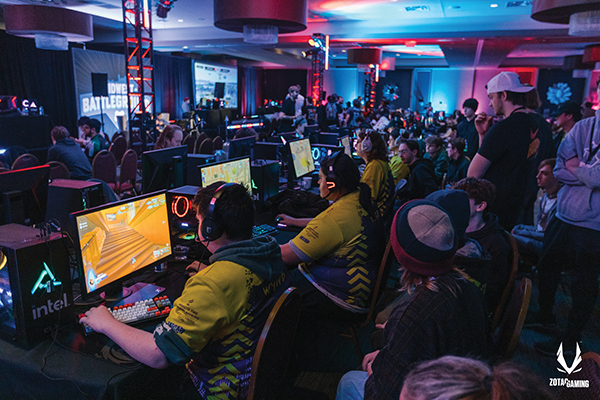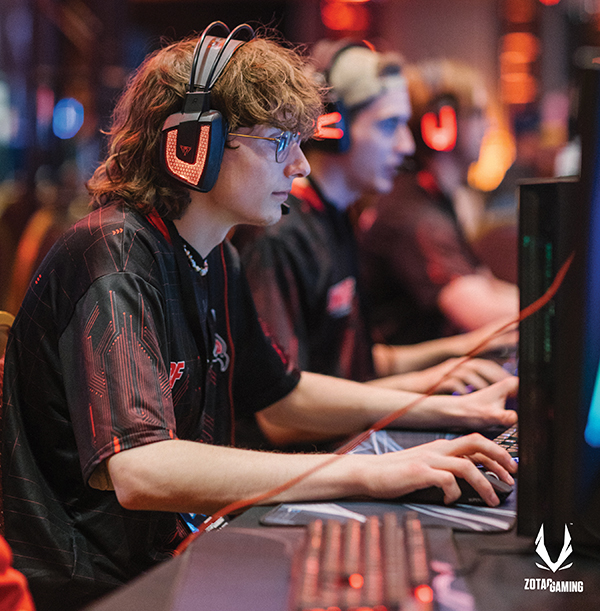
Esports is one of the sports that is still trending and growing as a popular event for destinations to host. A few destinations have built esports specific venues. Esports Stadium Arlington and HyperX Esports Arena Las Vegas (located in the Luxor) are two of these venues.
One unique aspect of esports is the connectivity that binds it to many different elements; unfortunately, in the rush to pursue esports, it may be the factor that is the most misunderstood.
Esports Connectivity with Power and Internet

When hosting an esports tournament, there are specific venue requirements. The venue requirements may include power, internet, lighting and audio-visual capabilities. Based on the esports tournament size and game, not all the requirements are the same.
The level of power that is needed for a tournament depends on the size of the event and the needs of participants. Will the tournament be broadcast? How many PCs will be used? Does the tournament need a stage? (Lighting and audio-visual will come into play if if the tournament needs to have a stage for the teams.)
Internet needs vary from tournament to tournament. If the tournament is to be broadcast, then there is a need for internet to upload the broadcast to the streaming platform (Twitch, YouTube), etc. Another question to ask is whether the games will need to be downloaded.
Multiple questions will face the organization offering an esports event for the first time. As one learning the needs of an esports tournament, I found no clear answer and reached out to one of the partners we work with, LANFest, who turned out to be a great resource, since the requirements for power and internet can be mind-boggling.
“Each esports tournament is unique and different since esports encompasses a large number of different types of games,” states Katie Briggs, President of LANFest. “Games such as Call of Duty and Counter-Strike, which are first-person shooter (FPS) games, have different requirements from that of Rocket League or a Fighting-Game Community (FGC) tournament.” (Examples might be Street Fighter, Mortal Kombat, Super Smash Bros., Tekken, Soulcalibur, Dead or Alive, Virtua Fighter and many others.)
Power and internet connectivity may be simple, or it may be complex. Let’s explore esports connectivity beyond power and internet.
Community is a huge connection for esports. Esports serve as a bridge between businesses and future workforces, provide educational opportunities, build stronger communities, inspire the youth to reach their dreams and create a sense of belonging.
Esports is more than playing in tournaments; the sport has its own ecosystems, just like traditional sports have their own ecosystem. If you’re a destination learning about bringing in esports, this ecosystem should be top of mind. STEM education (including careers in the field) can be a valuable component.
“What we’re witnessing is a cultural movement, and just like traditional sports, esports bring with it its own ecosystem: technology, media, branding, education, logistics and leadership,” states Sarah Kneller, Chief Experience Officer of August Interactive.
Beyond power and internet, esports are connecting the business community with students and even connecting the students with STEM education. Esports create a community and it creates connections. Kneller states, “Esports isn’t just about competition; it’s about curiosity, collaboration and building the kind of systemic understanding that unlocks innovation.”
Students can develop games, be innovative with developing strategies and participate as part of a team. These experiences create inspiration for a career in media, technology, cyber security, game development and business.
More high schools and colleges are forming esports teams. League competitions take place throughout the school year. High school esports associations host state competitions each year with fall and spring championships. The high school state championships consist of multiple games so that more high school teams may participate.
The Washington State Scholastic Esports Association (WSSEA) is hosting the 2025 Spring State Championships at the Lynnwood Event Center (Lynnwood, Washington) on May 18. Teams will be competing in Rocket League, Valorant and Super Smash Bros. Ultimate.
Both high school and collegiate tournaments create connectivity beyond games. These tournaments have educational workshops and college career fairs incorporated into the tournament. High schoolers can talk with colleges and universities to learn what the school has to offer, as well as about esports scholarships available. WSSEA will have colleges in attendance at their spring state championships.

In early March 2025, DuPage Sports Commission hosted the Midwest Battleground powered by Zotac Gaming. The tournament had a collegiate invitational and open tournament and the Illinois High School Esports Association (IHSEA) had a Super Smash Bros. Ultimate championships.
This tournament was more than just competition. Panels and workshops were scheduled throughout the week for students to learn more about esports. “Value of Esports,” “Get Equipped for Leadership in the World of Scholastics Esports” and “How to Build a PC Workshop” were among the workshops, which illustrated how esports connects students to business and leadership.
Esports connectivity within business and education fosters intangible yet essential benefits.
“For the business community, esports represent a living, breathing case study in real-time strategy, consumer behavior and digital engagement,” states Kneller. “For education, it’s about more than gamifying content; it’s about creating pathways where students learn critical skills in systems thinking, communication, teamwork, digital literacy and even STEM fields like network engineering or computer science.”
Esports connect people beyond education and careers. They create a community for those who may not use traditional sports as way to build friendships, teamwork and positivity. The Boys & Girls Club of Snohomish County works closely with the Everett Police Department and its Youth Services Division to provide special program initiatives for youth and teens in the Greater Everett community. The BGCSC philosophy emphasizes the importance of meeting the youth wherever they are in order to align with their interests. From this collaboration, an Egaming with the Cops tournament was born.
This tournament paired law enforcement representatives with youth from the Boys & Girls Club members. The Egaming with the Cops tournament began in August 2023 with 75 Boys & Girls Clubs and six law enforcement agencies playing Rocket League. In 2024, this tournament grew to 12 law enforcement groups and upwards of 50 police, sheriffs and state patrol officers who engaged with 150 kids.
Connecting youth and law enforcement agencies has led to connections beyond power and internet, note organizers.
“One of the most important successes has been seeing the positive relationship that has developed between our local police and sheriffs and the youth and teens at our Boys & Girls Clubs,” states Robert Cannon, Boys & Girls Club of Snohomish County Director of Development. “By strengthening the ties between our law enforcement and community members, we help build a stronger, more resilient community. Whether it’s law enforcement, local government or our partner businesses, bringing the community together to connect with youth families and clubs allows us to do more together.”
This connectivity between esports, youth and law enforcement creates a positive engagement and creates year-round mentoring between the two groups. BGCSC is building relationships and their esports program is giving youth an opportunity to become a future leader.
“Esports also represent a viable opportunity for the youth to enter the 21st century workforce,” states Cannon. “Youth represent our future leaders and through esports, we can show young people the workforce and industry possibilities, inspire them to reach for their dreams and have some fun at the same time.”
Esports and connectivity include many different people within our communities. Military veterans comprise another group that is involved with esports. Sarah Kneller states, “Veterans often find themselves isolated, struggling to find their place in civilian life. But online, in game, they find camaraderie again. They find teammates. They find a mission. It’s not just about gaming. It’s about belonging.”
Esports connectivity goes beyond power and internet. It builds community, belonging, future leaders, knowledge, critical thinking, mentoring, teamwork, strategies and purpose. What can esports connectivity bring to your destination? SDM

